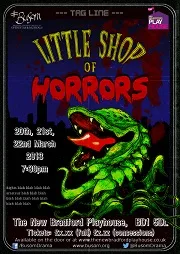Sunday’s visit to Thought Bubble wasn’t our only Steampunk-related outing last week. On Thursday, we went to see Professor Elemental, again in Leeds at The New Roscoe.
Christine and I have been fans for a while, but this was our first opportunity to see him perform live. His music is in a rather niche sub-genre called ‘chap hop‘ – imagine hip-hop, but with moustachioed English gentlemen rapping about tea and splendid trips to the seaside. Consequently, Professor Elemental has a major following in the steampunk community.
Local band Biscuithead and the Biscuit Badgers were the support act, in somewhat reduced circumstances as their drummer had a family medical emergency. Their music is wonderfully whimsical, with songs about David Attenborough, model railways, tweed jackets, and the folk who live on their local street. Whilst a rather different style of music to the main act, it fitted the offbeat nature of the gig.
Professor Elemental came on later, having sat in the audience for the support act; this was a small venue and there were only around 50-60 attendees. After powering through a medley of songs, he improvised a rap based on word suggestions from the audience, which included ‘antiquity’, ‘flange’, ‘antidisestablishmentarianism‘ and ‘nipple’. It was an impressive feat. Audience participation was also requested for his newer song Don’t Feed The Trolls.
Christine and I had come straight from work, and the weather was inclement to say the least, so we had left our steampunk outfits at home to save them for Thought Bubble, but many others were dressed up in appropriate attire. At one point, someone dressed as a giraffe crawled across the stage, and that probably wasn’t the strangest thing that happened.
Whilst it helped that many of the audience were genuine fans, it was a great, intimate gig – equal parts enjoyable and amusing. Professor Elemental isn’t on tour, per se, but he has a few more live gigs coming up around the country in the run up to Christmas – I’d definitely recommend going to see him.



